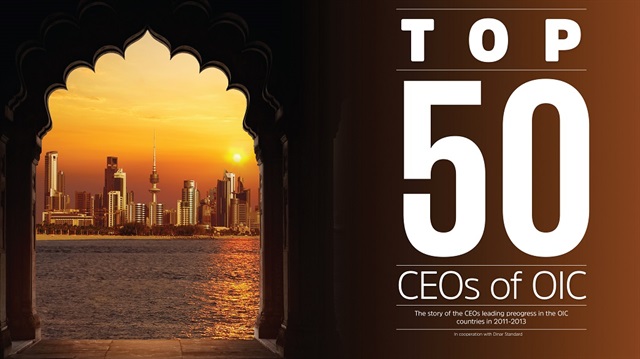
Derin Ekonomi, a Turkish monthly economy magazine, and Dinar Standard, the New York-based growth strategy research and advisory firm, have teamed up to identify the most successful executives in 57 OIC, Organization of Islamic Cooperation member states, who expanded their companies in the fastest way possible.
As part of this analysis, they have searched which state-run and private companies have achieved making sales revenue of $800 million and over, by the end of the 2013 fiscal year. The study showed that the OIC countries have a total of 122 companies which conform to these financial criteria.
The average growth rates of these companies were calculated by considering the annual revenues they declared for the term between 2011 and 2013. This work had led to the discovery of the top 50 companies that succeed in hitting the highest annual revenue and the top executives who were directing them during this term.
Malaysia and Turkey have topped the list of the best-performing 50 CEOs worldwide with eight executives for each, according to the research. In the project, Saudi Arabia and United Arab Emirates came second with seven CEOs for each. The list has also featured four top executives in Iran and three top executives in Indonesia. Five countries - Azerbaijan, Libya, Jordan, Iraq and Oman - have each been represented by only one top executive, while the list displayed two CEOS each for Qatar, Kazakhstan, Kuwait and Morocco.
Turkey appears on the list due to its leading companies Enka Holding, Koç Holding, Yıldız Holding and Boydak Holding. The list also showed two of Turkey's biggest banks, state-run lender Halkbank and Vakıf Bank.
Among the top Turkish executives who made an outstanding achievement in promoting their trademarks are Temel Kotil, the chair of Turkish Airways, Murat Ülker from Ülker Group and Galip Aykaç from BİM.
Rovnag Abdullayev, the CEO of Azerbaijan's state-run oil company SOCAR, has been placed at the top of the list showing the most successful 50 CEOs in the Islamic world.
Datuk Lukman Ibrahim, an executive of the Malaysian-based Proton, came third behind Nouri Berruinen, from Libya National Oil Company, who came second on the list.
Azerbaijan's national oil company, SOCAR, has become the fastest growing company between 2011 and 2013, among the companies who had sales revenue of $ 800 million dollars and over. In this era, SOCAR has hit 78.79 percent of an average annual growth rate.
Libya's national oil company, NOC, has moved into the second place with the 34.64 percent of an average annual growth rate in the list despite turmoil which rocked the country in this era.
Malaysian-based local automobile manufacturer, Proton, has gained the third place with the 31.80 percent of an average annual growth rate.
The analysis features only one female executive among 50 leading business leaders. Karen Agustiawan, CEO of the Indonesian state-run oil and gas company, has gained in the 41st place in the list
The list of the top 10 CEOs is composed of Dato Mohd Emir Mavani Abdullah of Malaysia-based Felda Holdings Bhd; Dato Sri Abdul Wahid bin Omar of Maybank Group; Ali Shareef Al Emadi of Qatar National Bank; James Hogan of Etihad Airways; Ali Soleimani Shayesteh, Parsian Bank; Sheikh Ahmed bin Saeed Al Maktoum, The Emirates Group; and Jamal Ba Amer of Samirsa.
Over the past 15 years, the continent of the West's 300-year dominance of global economy has increasingly faced challenges from countries in Asia, Africa and Latin America, as well as countries in the Muslim would.
It is a precedent that the share, which Western countries have taken from global economic growth in this era, has been seen below 50 percent after centuries. The economic size of 57 states, also members of the OIC, has expanded $6.7 trillion as of 2013.
Since the 1980s, while Malaysia, Indonesia and Saudi Arabia have become the leading countries who succeeded in adapting to the global economy, Turkey has become an industrial base for the European Union.
Malaysia has become a member of the class comprised of developed countries by its technological achievements. In the next five years, Islamic countries are estimated to experience a growth which is 1.8 points larger than the world average and witness a growth which is 1.5 larger than the BRIC countries comprising of Brazil, Russia, India and China.

Staff of the Derin Economy magazine














